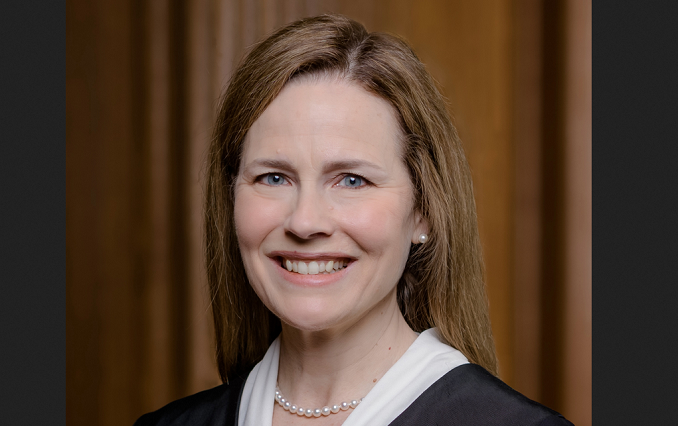Supreme Court Justice Amy Coney Barrett, whose vote helped overturn Roe v. Wade and restore protections for the unborn to the democratic process, described the unprecedented leak of the Dobbs draft opinion as a “huge breach of trust” in a rare public interview.
Her comments underscored the sanctity of the court’s deliberative process amid ongoing efforts to safeguard the God-given right to life.
Speaking at an event at Lincoln Center, Barrett addressed the 2022 leak that prematurely revealed the court’s decision in Dobbs v. Jackson Women’s Health Organization, which ended Roe v. Wade and unlimited abortions and empowered states to enact pro-life laws protecting innocent human life from conception.
The disclosure, she said, shattered the confidentiality essential to judicial integrity, a principle pro-life advocates view as intertwined with the moral imperative to defend the vulnerable without political interference.
LifeNews is on TruthSocial. Please follow us here.
“A huge breach of trust,” Barrett called the incident, emphasizing its violation of the collegial bonds that allow justices to debate sensitive issues like the humanity of the unborn without external pressure.
“I personally have worked hard not to let it change or make me paranoid, change the way that I relate, because I think one of the beautiful things about the way that the court operates is the trust that we have,” she said. “But, you know, you’re looking over your shoulder.”
The leak, carried out by an unknown insider, fueled national division and threats against the court just as it prepared to affirm that abortion is not a constitutional right, a ruling that has since saved countless lives by allowing states to prioritize the fundamental dignity of every child.
Barrett’s reflections come at a time when the Supreme Court’s trust has been tested by cultural battles over life issues, yet her words reaffirm the judiciary’s duty to interpret the Constitution without imposing unenumerated rights that undermine the right to life.
“The Court’s role is to respect the choices that the people have agreed upon, not to tell them what they should agree to,” she stated, praising the Dobbs outcome for devolving authority to states where voters can enact laws shielding the unborn from what she described as a fabricated “fundamental liberty.”
In excerpts from her forthcoming memoir, “Listening to the Law: Reflections on the Court and Constitution,” set for release Tuesday, Barrett further defended her pivotal role in Dobbs, arguing that Roe v. Wade represented an overreach that ignored historical truths about the value of prenatal life.
“The evidence does not show that the American people have traditionally considered the right to obtain an abortion so fundamental to liberty that it ‘goes without saying’ in the Constitution,” she wrote, rejecting the notion that abortion holds deep roots in American tradition.
“In fact, the evidence cuts in the opposite direction. Abortion not only lacked long-standing protection in American law — it had long been forbidden,” Barrett added, highlighting centuries of legal recognition that unborn children deserve protection, a stance celebrated by pro-life groups as a return to the nation’s moral foundations.
Even as she navigated personal attacks following her Dobbs vote, Barrett invoked the late Justice Ruth Bader Ginsburg to bolster her position. “Justice Ruth Bader Ginsburg, herself a supporter of abortion rights, observed nearly twenty years after Roe that the case may have ‘halted a political process that was moving in a reform direction,’ ‘prolonged divisiveness,’ and ‘deferred stable settlement of the issue,’” Barrett noted, pointing to how Roe stifled democratic progress toward greater protections for life.
Since Dobbs, at least 18 states have passed laws banning or severely restricting abortion, preventing the deaths of thousands of unborn children annually and affirming that true liberty begins with the right to life endowed by the Creator. Barrett’s interview and memoir serve as a reminder that the court’s work, though often behind closed doors, ultimately upholds the foundational principle that every life matters.











